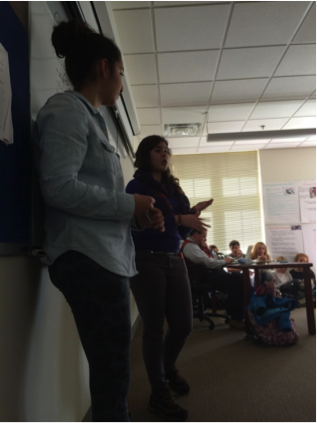The A&A building was abuzz with debates as high school students participated in WIS’s inaugural Global Issues Forum on Thursday, February 5. In groups of 15 to 25, students both facilitated and engaged in discussions about international issues.
All of the topics were current problems many students talk about outside of the classroom, and since WIS considers itself an open-minded, global school, the school’s faculty decided to devote time to conversations about these global, timely issues. The six choices for debate – suggested by both students and faculty – were immigration policy, free speech, religious extremism, racism, rape culture, and environmental issues.
The idea was for students to learn “how to talk about these issues with someone in a way where you’re not trying to convince somebody of your ideas, where you just get the chance to talk about [them] and explore [them],” according to Kerri Redding, WIS’s Digital Media Arts teacher and the architect of the forum. After coming up with the idea it took Redding only a few short weeks to make the discussions happen, despite the immense amount of coordination and planning that went into them.
Though the teachers intended the forums to be discussions rather than full-out debates, some students were disappointed by the dryness of the conversations. Participants complained that the facilitators didn’t do enough to stimulate debates, or that the topics veered toward subjects that everyone agreed on, therefore stalling conversation.
Alexia Godron, a student-facilitator for an environmental issues forum, was especially upset that the conversations didn’t result in any passionate arguments. “I think that they should’ve chosen more debatable topics,” she remarked, looking back at the forum. “There are a lot of environmental issues that can be debated; [for example] I had suggested doing a discussion on the pipeline that is being built right now in the United States, which is very controversial.”
Another complaint that many students voiced was in regard to the rules that attempted to regulate the conversations. The rules included a time limit so no one person could speak for more than 90 seconds at a time, as well as a queue where students had to raise their hands before they were to be added to a speaker’s list. Most facilitators ignored these rules, complaining that they made the dynamic of the rooms too formal and that the guidelines were laughably strict.
Ninth grader Annabelle Friedman complained,“[the queue and timing] kind of made it a little too orderly, like if you said something and I wanted to say something in response to that, I would have to wait for five people…. while I thought that it had the right idea, it also kind of limited the conversation.”
But despite minor problems, Friedman and Godron, like many other students, enjoyed the Global Issues Forum overall. Friedman plans on being a student-facilitator if WIS decides to repeat the endeavor, and Godron acknowledges that “the forum is a great idea and that it really reflects the school’s mission and goal by making us aware of global issues.”
By Rosie Bradbury


































































